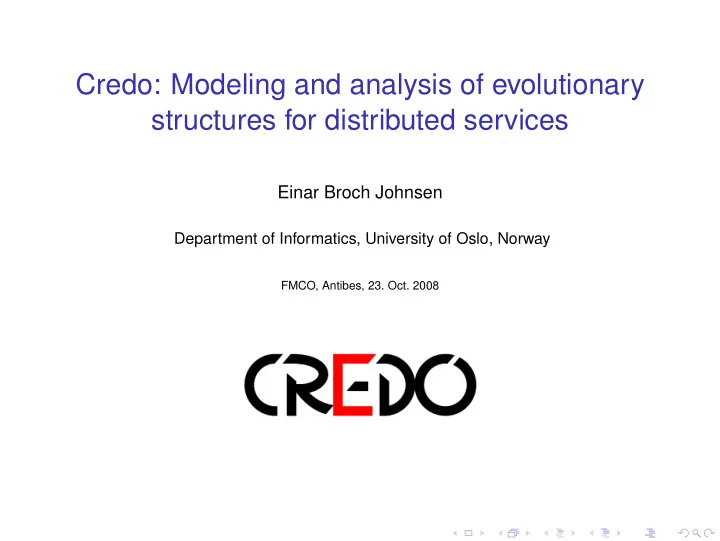

Credo: Modeling and analysis of evolutionary structures for distributed services Einar Broch Johnsen Department of Informatics, University of Oslo, Norway FMCO, Antibes, 23. Oct. 2008
CREDO Overview What is CREDO? Modeling and analysis of evolutionary structures for distributed services • Aim : Compositional modeling and validation framework for dynamically evolving software • Separation of concerns : computation, coordination, scheduling • Partners • Academic: CWI Amsterdam, U Oslo, U Kiel, TU Dresden, UNU-IIST Macau, U Uppsala • Almende: ASK system – dynamically connecting people • Rikshospitalet, NCC: Biomedical sensor networks • Project duration : 3 years from Sep. 2006 (FP6, STREP) Einar Broch Johnsen (UiO) CREDO 23.10.08 2 / 4
CREDO Overview What is CREDO? Modeling and analysis of evolutionary structures for distributed services • Aim : Compositional modeling and validation framework for dynamically evolving software • Separation of concerns : computation, coordination, scheduling • Partners • Academic: CWI Amsterdam, U Oslo, U Kiel, TU Dresden, UNU-IIST Macau, U Uppsala • Almende: ASK system – dynamically connecting people • Rikshospitalet, NCC: Biomedical sensor networks • Project duration : 3 years from Sep. 2006 (FP6, STREP) Einar Broch Johnsen (UiO) CREDO 23.10.08 2 / 4
CREDO Overview What is CREDO? Modeling and analysis of evolutionary structures for distributed services • Aim : Compositional modeling and validation framework for dynamically evolving software • Separation of concerns : computation, coordination, scheduling • Partners • Academic: CWI Amsterdam, U Oslo, U Kiel, TU Dresden, UNU-IIST Macau, U Uppsala • Almende: ASK system – dynamically connecting people • Rikshospitalet, NCC: Biomedical sensor networks • Project duration : 3 years from Sep. 2006 (FP6, STREP) Einar Broch Johnsen (UiO) CREDO 23.10.08 2 / 4
CREDO Overview What is CREDO? Modeling and analysis of evolutionary structures for distributed services • Aim : Compositional modeling and validation framework for dynamically evolving software • Separation of concerns : computation, coordination, scheduling • Partners • Academic: CWI Amsterdam, U Oslo, U Kiel, TU Dresden, UNU-IIST Macau, U Uppsala • Almende: ASK system – dynamically connecting people • Rikshospitalet, NCC: Biomedical sensor networks • Project duration : 3 years from Sep. 2006 (FP6, STREP) Einar Broch Johnsen (UiO) CREDO 23.10.08 2 / 4
CREDO Overview Modeling • Creol • Executable OO modeling • Active objects, futures, support for reprogramming • Abstracts from internal scheduling • ADTs for internal state • Abstracts from environment/network properties • Coordination & scheduling • Reo: general coordination language • Network behavior: (mobile) channels with various properties • Application-specific schedulers for intra-object processes Einar Broch Johnsen (UiO) CREDO 23.10.08 3 / 4
CREDO Overview Modeling • Creol • Executable OO modeling • Active objects, futures, support for reprogramming • Abstracts from internal scheduling • ADTs for internal state • Abstracts from environment/network properties • Coordination & scheduling • Reo: general coordination language • Network behavior: (mobile) channels with various properties • Application-specific schedulers for intra-object processes Einar Broch Johnsen (UiO) CREDO 23.10.08 3 / 4
CREDO Overview Validation • Approach : Lightweight, not deductive techniques • Validation by automatable techniques • Simulation: Creol interpreter allows querying-driven simulation • Type-based analysis: both for concurrent objects and network • Testing: both for concurrent objects and network • Model checking: esp. for coordination/schedulers aspects Talks today • M. Kyas : OO models and Heterogeneous Networks • B. Aichernig : Testing Concurrent Objects • S. Kl¨ uppenholz : Verifying Dynamic Coordination Models Einar Broch Johnsen (UiO) CREDO 23.10.08 4 / 4
CREDO Overview Validation • Approach : Lightweight, not deductive techniques • Validation by automatable techniques • Simulation: Creol interpreter allows querying-driven simulation • Type-based analysis: both for concurrent objects and network • Testing: both for concurrent objects and network • Model checking: esp. for coordination/schedulers aspects Talks today • M. Kyas : OO models and Heterogeneous Networks • B. Aichernig : Testing Concurrent Objects • S. Kl¨ uppenholz : Verifying Dynamic Coordination Models Einar Broch Johnsen (UiO) CREDO 23.10.08 4 / 4
CREDO Overview Validation • Approach : Lightweight, not deductive techniques • Validation by automatable techniques • Simulation: Creol interpreter allows querying-driven simulation • Type-based analysis: both for concurrent objects and network • Testing: both for concurrent objects and network • Model checking: esp. for coordination/schedulers aspects Talks today • M. Kyas : OO models and Heterogeneous Networks • B. Aichernig : Testing Concurrent Objects • S. Kl¨ uppenholz : Verifying Dynamic Coordination Models Einar Broch Johnsen (UiO) CREDO 23.10.08 4 / 4
Recommend
More recommend